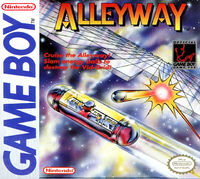Difference between revisions of "Alleyway"
| Line 18: | Line 18: | ||
The player controls a paddle at the bottom of a screen while a ball bounces around. In the ''Breakout'' tradition, the paddle must be maneuvered to catch the bouncing ball and reflect it to destroy all of the blocks gathered near the top of the screen. A stage is completed when all of the blocks are destroyed, and the player had a limited number of lives to so (each life being depleted when the ball misses the paddle). There are twenty-four stages as well as eight bonus stages that are played after every third stage. ''Alleyway'' cannot save. | The player controls a paddle at the bottom of a screen while a ball bounces around. In the ''Breakout'' tradition, the paddle must be maneuvered to catch the bouncing ball and reflect it to destroy all of the blocks gathered near the top of the screen. A stage is completed when all of the blocks are destroyed, and the player had a limited number of lives to so (each life being depleted when the ball misses the paddle). There are twenty-four stages as well as eight bonus stages that are played after every third stage. ''Alleyway'' cannot save. | ||
| − | The game notably has several ''Mario'' references, as the bonus stages and ending image use images from the ''[[Portal: Mario | + | The game notably has several ''Mario'' references, as the bonus stages and ending image use images from the ''[[Portal: Mario|Mario]]'' games. Additionally, the international releases implied that the protagonist was [[Mario]] himself, and an opening animation depicts him boarding the paddle. |
=Legacy= | =Legacy= | ||
| Line 28: | Line 28: | ||
*In August 2000, it was rereleased through the [[Nintendo Power|Nintendo Power system]]. | *In August 2000, it was rereleased through the [[Nintendo Power|Nintendo Power system]]. | ||
*It was released for download through the [[3DS]]'s eShop as part of the [[3DS Virtual Console]] in 2011. It was one of that Virtual Console's launch titles in all regions except for Japan. | *It was released for download through the [[3DS]]'s eShop as part of the [[3DS Virtual Console]] in 2011. It was one of that Virtual Console's launch titles in all regions except for Japan. | ||
| + | *In May 2024, it was added to the [[Nintendo Switch]]'s digital library of Game Boy games that could be freely played by [[Nintendo Switch Online]] subscribers. | ||
[[Category: Game Boy Games]][[Category: 3DS Virtual Console Games]] | [[Category: Game Boy Games]][[Category: 3DS Virtual Console Games]] | ||
Latest revision as of 19:03, 14 May 2024

| |
| Alleyway | |
| Developer | R&D 1, Intelligent Systems |
| Publisher | Nintendo |
| System | Game Boy, 3DS Virtual Console |
| Release Date | Game Boy JP April 21, 1989 US August 1989 EU September 28, 1990 3DS Virtual Console US June 6, 2011 EU/AU June 7, 2011 JP August 3, 2011 SK April 6, 2016 |
| Rating | ESRB: E |
Alleyway is a Breakout-styled puzzle game for the Game Boy and was one of the system's launch titles in America and Japan.
Gameplay[edit]
The player controls a paddle at the bottom of a screen while a ball bounces around. In the Breakout tradition, the paddle must be maneuvered to catch the bouncing ball and reflect it to destroy all of the blocks gathered near the top of the screen. A stage is completed when all of the blocks are destroyed, and the player had a limited number of lives to so (each life being depleted when the ball misses the paddle). There are twenty-four stages as well as eight bonus stages that are played after every third stage. Alleyway cannot save.
The game notably has several Mario references, as the bonus stages and ending image use images from the Mario games. Additionally, the international releases implied that the protagonist was Mario himself, and an opening animation depicts him boarding the paddle.
Legacy[edit]
Some of the code in Alleyway was later used for Nintendo's next Breakout-inspired game, which was Kirby's Block Ball.
Ports and Remakes[edit]
- In August 2000, it was rereleased through the Nintendo Power system.
- It was released for download through the 3DS's eShop as part of the 3DS Virtual Console in 2011. It was one of that Virtual Console's launch titles in all regions except for Japan.
- In May 2024, it was added to the Nintendo Switch's digital library of Game Boy games that could be freely played by Nintendo Switch Online subscribers.